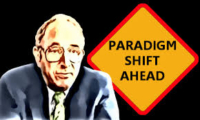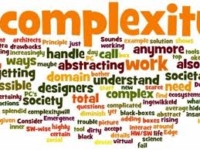
To use a word my ten year old granddaughter has come to love, I’ve been obsessed with paradigm shifts and systems theory ever since I read Thomas Kuhn’s landmark book in my first research methods class in 1966. The professor who made me read The Structure of Scientific Revolution also got me interested in systems theory through cybernetics when he learned that I had started college planning to major in either physics or engineering and already had some programming experience before I took my first political science class.
Over the years, paradigm shifts and systems (now viewed through a complexity lens) have become central to my work, but I’ve often found myself struggling to convince my fellow peacebuilders that these were issues worth paying attention to.

In the first half of this year, I got to know the evolutionary biologist David Sloan Wilson through his work with ProSocial World and, now, one of its spinoff projects the New Paradigm Coalition. Wilson, his economist colleague Dennis Snower, and a few other created the coalition earlier this year to explicitly consider new paradigms that focus on interdependence, evolution, commons-related problems, and psychological flexibility..
 The group now has about 100 members who have been meeting privately—but not secretly—since the beginning of the year. I joined shortly thereafter. Most meeting have started with presentations by coalition members about key economic and related issues, including peacebuilding. Since June, we have dedicated a meeting a month to expanding our work. If nothing else, the fact that we meet in the early afternoon on Mondays prevents half of the people of the world from working with us because it’s the middle of the night where they are.
The group now has about 100 members who have been meeting privately—but not secretly—since the beginning of the year. I joined shortly thereafter. Most meeting have started with presentations by coalition members about key economic and related issues, including peacebuilding. Since June, we have dedicated a meeting a month to expanding our work. If nothing else, the fact that we meet in the early afternoon on Mondays prevents half of the people of the world from working with us because it’s the middle of the night where they are.
We’ve made enough progress for David to decide that it was time to go public. So, last week, he invited a group of about twenty of us for a long conversation over dinner to talk about next steps.
I realized that the dinner itself wasn’t all that newsworthy. But the ideas that brought us together are. So is the breadth we already find in the coalition out of which its potential emerges.
I want to be clear here. I personally would not have started with economic issues. Nonetheless, it’s now clear to me that it is one of the best entry points for a discussion of new paradigms and that the coalition’s work will have to have an integral role in the work we do on Peacebuilding Starts at Home. If anything, its work may actually be more important for drawing people into the work for promoting large scale social change.
Let me explain.
From Paradigm Shifts in General to The New Paradigm Coalition
As I’ve gotten to know David Sloan Wilson, I’ve realized that he has done remarkable things in the last twenty years in transforming his professional career. He first built his reputation as one of the leading evolutionary biologists of my generation.
At some point in the middle of his already accomplished career, he started working with colleagues with similar world views but whose intellectual homes lay elsewhere. That started with Elinor Ostrom’s core design principles for managing shared resources which I wrote about a few months ago. He has since moved on to work with clinical psychologists, anthropologists, environmental scientists, sociologists, and more. In October, we will be meeting with a group of senior foreign policy makers.
If there is a common denominator here, it is his belief that we have to probe past the specifics of the issues that are troubling and dividing us and see them as part of a larger problem whose roots lie in the social, scientific, and personal mindset we use to address them.
Given my long-standing fascination with paradigm shifts, I leapt at the opportunity to join the coalition.
I don’t fully know why David started the coalition by emphasizing the economic aspects of a new paradigm, but his list of reasons includes the role that the Mont Pelerin Society played in the adoption of the neoliberal paradigm in the 1970s and beyond. Created by Friedrich Hayek, the young Milton Friedman, and others in 1947, its founders wanted to undermine support for Keynesian and Social Democratic economic models at which it has largely succeeded.

From where Wilson (and I) sit, the neoliberal paradigm (or whatever label you choose to give it), dominates economic thinking to the point that we are rarely even aware that we are using it. At the same time, the paradigm is increasingly running out of steam as analysts like Ostrom so effectively pointed out.
So, Wilson and the rest of us are asking, what would a new paradigm be like that takes our interdependence and the other implications of systems theory as a starting point? How would it lead us to see the role of individualism differently? Or our responsibility to society as a whole? Or charting our own evolution so that we “fit” a society defined by that very interdependence?
We’re ending up with a new paradigm that is quite different from the laissez-faire models that Adam Smith and others designed for an emerging capitalism two and a half centuries ago. It is also quite different from the traditional progressive policies I’ve supported in the past.
At this point, it makes more sense for you to watch David’s presentation rather than read my distillation of what he has to say.
https://www.youtube.com/watch?v=ReYhKKQ–1c
We know that we haven’t defined what the new paradigm includes for economics let alone for other disciplines. Nonetheless, we’ve made enough progress and attracted a diverse enough support network that that it is time to go public and expand our work.
Plans
Our dinner was by no means a public launch event. We met in a small private room in a mid-town restaurant that couldn’t have held much more than the twenty people who were in the room.
What we did was sketch out four areas in which we need to expand in the course of the next year or so.
Content. Most of the people in the room last week as well as members who weren’t able to get to New York acknowledge that we’ve just begun defining what the new paradigm itself is. David and Dennis’s work is a great start, but there is plenty still to do as we begin working with others who have decided that the current paradigm is the root cause of many of today’s problems. Perhaps because I’m not an economics and have never seen myself developing “big ideas,” this is not the part of the work I personally expect to focus on.
Who is involved. We have largely grown by word of mouth in ways that build on the personal networks of Wilson and the other founders. That’s how I got there. As a result, we need to diversify in any number of ways. We are too white, male, and old. We also need more people with practical, entrepreneurial experience. We need people who know how to package abstract intellectual ideas—like the term paradigm itself—for “real world” audiences. That is already beginning to happen, and I hope that I can contribute by bringing in people know who would be more interested in a new paradigm than in the peacebuilding work that occupies most of my time.
Move beyond economics. Ours is not called a new economic paradigm. As I understand things, David and Dennis started with economic issues because they touch on almost everything else that matters today, including climate change, racial and other forms of inequality, and my beloved peacebuilding. In time, we will have to add those other issues to our arsenal (I know, an odd term for a peacebuilder to use) by bringing people whose expertise lies outside of economics into the coalition. More importantly, we will find ways of bringing the coalition’s ideas to other groups of activists, something we will do when David helps lead a workshop I’m organizing to bring peacebuilders and others together to flesh out what we hope to accomplish in AfP’s Peacebuilding Starts at Home project so that we incorporate paradigm shift related ideas in our work.
Incubate projects. The coalition also has to bring the often abstract ideas we discuss in our weekly meetings to life in the “real world.” One of the reasons I was drawn to Wilson’s work was his understanding that sweeping changes have to start at the grass roots with projects that bring everyday people into the fold while also demonstrating that the new ideas can actually work. This is, of course, the same logic underlying local peacebuilding which has been at the heart of most AfP members’ work for a decade or more. In this case, we are beginning to explore partnerships with organizations and funders who could help us incubate projects.
A Bottom Line: An Intentional Paradigm Shift
Finally, there is an important bottom line here.
If you go back and read Thomas Kuhn’s remarkable book on scientific revolutions, you realize that none of the innovators whose work he documented set out to lead a paradigm shift.
Not because the term hadn’t been invented yet. Rather, the anomalies that led someone like Copernicus found kept accumulating to the point that he realized that something was wrong with the basic assumptions that the scientific community was making.
Our coalition is different in one key respect. We are going into our work consciously trying to pull off a paradigm shift which almost never happened in the past—including in the writing of the United States Constitution almost two and a half centuries ago.
In other words, setting out to consciously and intentionally create a new paradigm is all but historically unprecedented.
That said, we aren’t the only people I know who speak in those terms. Indeed, I’ve used them myself for decades.
But, I’ve decided to cast my lot with the New Paradigm Coalition because the others who are working to define and promote a new paradigm lack the broad intellectual and social base—let alone the ambition—I’ve seen in David’s work over the last six months or so.
We are both in our mid-seventies and know that we almost certainly won’t live to see the new paradigm become the dominant way we understand and manage the world and its problems. You can see that in the image I put at the top of this post which I borrowed from the coalition’s landing page on the ProSocial site (we don’t yet have a web site of our own). We are still a tiny band of metaphoric mountain climbers who are just beginning a very long trek up a steep and snowy metaphoric mountain.
Still, it’s a wonderful—and enjoyable—challenge for us to take on.
At any age.
NEXT TIME: Labor Day and peace
The views and opinions expressed in this article are those of the author and do not necessarily reflect the official policy or position of the Alliance for Peacebuilding or its members.
